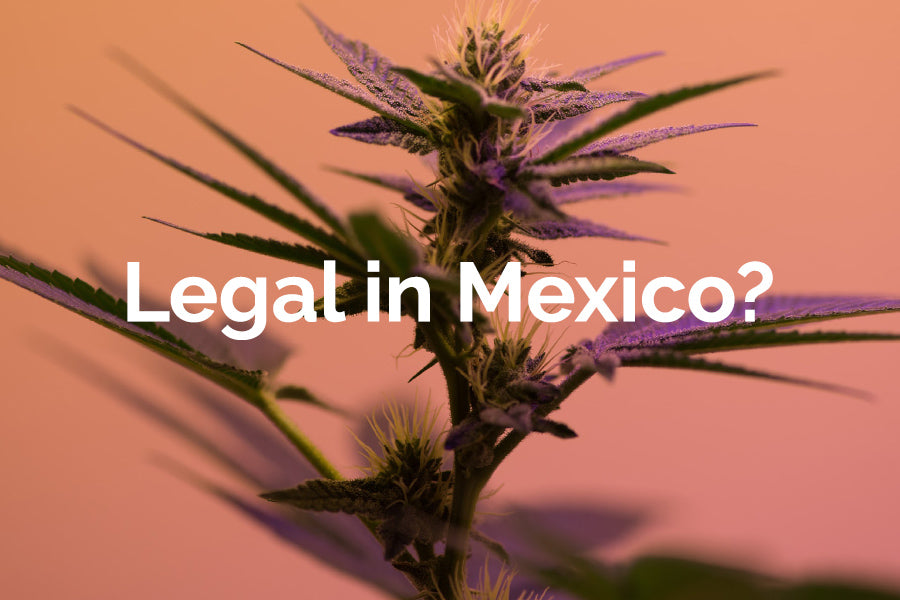Will be legalized in Mexico the world’s largest legal Cannabis Market?

Soon the United States will be put among two nations with federally legalized marijuana. Mexico proceeded with legislation and legalizing of the cannabis plant for a variety of reasons, and all of this happened just days before the Thanksgiving holiday.
This follows Canada's historic legalization that took place many years ago and created the following:
- A viable international marketplace
- Channeling funds through Canadian markets
- And lastly effectively mobilizing the global cannabis industry.
The U.S. missed an opportunity to see to that NASDAQ and the New York Exchange would have a role in the controlling of financial markets and dollars funneling into cannabis, when Canada legalized.
This did not come as a surprise as Jeff Sessions was in control of the Department of Justice (DOJ). There was not necessarily a pro-cannabis Administration under Trump and definitely not under Senator Majority Leader Mitch Mc Connel’s leadership.
I know you are probably wondering, what are the effects that America will experience when doing business with partners directly to the north and south?
But none of this matter because the U.S. has legalized adult-use marijuana programs state-by-state, right? That is correct, but the dispensary models still violate the law and have collected bipartisan support from American politicians, and this will prevent the DOJ from interfering with the legal state marijuana business. But the issue is larger than this.
I’m referring to the global cannabis economy, and Mexico is the largest country in the world by population that will then legalize cannabis.
What does this mean?

Mexico will then possess the biggest consumer market for cannabis products, with a population of more than 125 million people, that crazy right? This will then represent a big jump forward for the developing international cannabis marketplace.
There are still a few steps that remain for cannabis to be federally legalized in Mexico, but the bill has been approved by the Mexican Senate.
The bill aims to “improve living conditions” and “contribute to the reduction of crime linked to drug trafficking,”
source:reuters.com
The bill will establish the following:
- Those who are 18 and older can purchase and possess up to 28grams of marijuana.
- A personal cultivation provision for individuals to cultivate up to 4 plants for their own personal use.
However, there is still a technical requirement that needs to be sorted out for instance whether the government needs to track personal cultivation or not. This was supposed to happen early this year as” two years ago the Mexican Supreme Court struck down a marijuana ban as unconstitutional and required lawmakers to pass legalization measures”
Mexico looks to:
- Regulate and legalize the plant
- Put strict controls on the ownership as well as the supply chain in place
- Engage in domestic
- Engage in international commerce that surrounds marijuana
The dollars that are invested in this industry must comply with all forms of financial source verification. This will lessen the opportunity for organized crime to participate in the business.
Hemp may or may not be included in the final version and this seems nonsensical to Mexico's legalization. The reason is that it may pose too much of a threat to existing Mexican industries.
What will happen if hemp is excluded from the final bill?
It means that there will be complications for the cannabinoid and CBD industry in Mexico.
What is the reason why other industries see industrial hemp as a threat?
A big part of Mexico’s economy is the maquiladoras.
According to the Oxford dictionary, maquiladoras is a factory in Mexico run by a foreign company and exporting its products to that company's country of origin, they then tap into the cheap labor and manufacturing goods for export of Mexico.
Several large maquiladoras have already started using hemp this includes BMW and Levi’s, which have facilities in Mexico.
Industries like automotive and textile are big players in the world, but hemp won't replace them. But what hemp will do is complement the existent operations and provide a plant that is more versatile and requires less water to farmers.
If the skills of Mexico’s farmers and the agricultural industry are paired with the manufacturing capabilities of the country and an international cannabis marketplace this could mean that the nation’s economy and citizenry could be in a great place.
What does this mean for the U.S. that are among two nations?
There will be major implications for the American drug policy and the cannabis reform as they proceed and maybe generate hundreds of million dollars for the participants in the process.
Maybe this will lead to the U.S. policymakers to approve the federal cannabis legalization. Especially in the time that we are facing now with a pandemic and an economic turndown. Let Mexico guide the way!
But before we come to an end of this article, here are some more economic benefits of legalizing weed:
- Exceptional benefits for the economy like tax revenues
- It will create hundreds of thousands of jobs
- It will create more investment opportunities
- More money will be saved due to more revenue being earned in the process.
- Black market sales of cannabis will decrease
- The cops will have fewer things to worry about and then can focus more on crimes and drugs that are harmful
- Less violence and low crime rates to go with it
- Health benefits
Let us look at the benefits of marijuana:
- It helps with pain management and relieves chronic pain
- It reduces inflammation
- Improves sleep
- Improves lung capacity
- Regulate and prevent diabetes
- Alleviates Anxiety
- Can help with PTSD symptoms
- Regulates seizures
There you have it guys here are all of the benefits of marijuana as well as the economic benefits of legalizing it. By legalizing marijuana, it will not only benefit the people’s health but also the economy. We can just hope that the U.S. policymakers approve the federal cannabis legislation.

